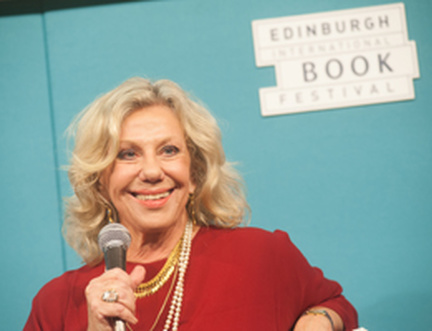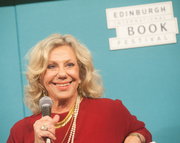More articles Thursday 25 August 2016 12:00pm
Feminist Pioneer Confronts Death, Grandmotherhood and Online Dating

For a start, it’s JONG not YONG. The grande dame of sexually liberated literature commenced her Book Festival appearance last night by clearing up the pronunciation of her surname – but noted that “at this moment, I hardly know what my name is, because I’ve been married so many times…” That’s four to date. Does it take that many tries to get it right? “In my case, yes. I would hope not for everyone because it is an awful lot of bother.” And yet it’s the bother of life, love and relationships that has provided Erica Jong with the raw material for her work, from the poetry that first gained her recognition, to her sensational 1973 bestseller Fear of Flying, through numerous further works of prose, journalism and fiction, all the way to her latest novel, Fear of Dying. Though she denies that she writes direct memoir – “you draw on your own life, but you change it” – Jong has delved with gusto into the most intimate aspects of life.
Fear of Dying sees an actress named Vanessa Wonderman dealing with the various demands of encroaching old age, and a marriage that nonetheless leaves her with enough excess sexual energy to join a frisky online dating site, cheekily called Zipless.com (readers of Fear of Flying will get the reference). “It took me a decade to write,” Jong said, “a decade in which my parents started to fail; my daughter got married and had three children; and my husband also nearly died. My father was dying when my grandson was being born – in the same hospital.” This onslaught of beginnings and endings informed the content of the book, as well as reinforcing Jon’s conviction that the cult of youth limits storytelling and society alike. “We’re starting to realise that every stage of life is interesting,” she said. “We have to see women of all ages – and men of all ages.” Indeed, the differences, she feels, are less pronounced that is sometimes suggested. “When we’re young we think men and women are different species. As we get older, we join the same species.”
Jong’s debut novel had more impact than most works of fiction on the conversation about male and female interaction, becoming a totem of second wave feminism for its frank, funny examination of marital dissatisfaction and female lust – and selling some 20 million copies. “Nobody was more shocked than I that that happened. I was in a state of utter terror. I was convinced no-one would ever publish it. It was thought of as a very literary book by a woman poet.” It took the passion of one editor, who recognised her own life experience in its pages, to position it for the mainstream success that it achieved. And its protagonist, Isadora Wing, lives on in the pages of Fear of Dying, as Vanessa’s best friend. “Everyone wanted me to write another Isadora book,” she said. “I swear to God I tried – but Isadora had a lot of baggage. It was really hard to write about her.” It was on the final draft of Fear of Dying that she realised: “Oh my God! She’s the best friend.” This allowed Jong to pay tribute to another important facet of her own life. “I don’t know where I would be without my female friendships. These people are the witnesses to your life; it’s such an important resource.”
But in the course of an exuberantly warm and positive account of Jong’s current life, little friendly feeling was in evidence for one particular figure. “I think he’s a pathological liar, a clinical narcissist, and a complete fraud.” No, not one of the three ex-husbands – but Donald Trump. “He’s an absurdity. It reflects very badly on my country that he’s got as far as he has.” His opponent, meanwhile, “has been slandered for thirty years”, her achievements discounted by “the United States of Amnesia. Hillary Clinton’s passions throughout her life have been bettering the status of women; helping the status of children; and civil rights.”
Well, should the worst happen, this ebullient chronicler of changing times can always make a new home in Scotland. Aspects of the culture seem to appeal. “I love men in kilts. And I’m told they wear no underwear – is that true? I have no problem with that.” Zipless indeed.


 Major new partnership with Celtic Connections
Major new partnership with Celtic Connections 

